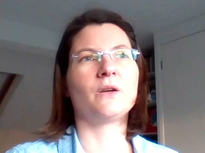Genevieve

Gender: Female
Ethnicity: White European
Background: Genevieve is 40 years old and is White European. She lives with her husband and two children and works as a biologist. Genevieve and her husband developed Covid symptoms and isolated before the first lockdown. She felt anxious about how her symptoms would develop. She feels let down by the government’s response to the pandemic.
More about me...
Genevieve began isolating before the first lockdown when both her and her husband experienced Covid symptoms. There was no testing available at the time. While her husband developed a cough, Genevieve didn’t and thought that her symptoms of tiredness, shortness of breath, and fever might be related to anxiety instead. She goes on to say that the fear of the symptoms getting worse was more difficult than her actual symptoms. Genevieve also experienced an unexpected symptom (ear itching) which lasted for two months after she had recovered.
As a molecular biologist, Genevieve understood more about viral infections than others and she felt reassured that children weren’t going to be affected as much by Covid. It also made her feel safer as a parent when schools remained open between September and Christmas.
Genevieve explains that coming out of isolation and seeing how life was during lockdown felt like “coming out of a cave”. She felt that the government hadn’t been doing enough to slow the spread of infections and it was like “watching this sort of happening without being stopped”. Genevieve also didn’t think that the government provided enough information about how long people who already had the virus were protected from being reinfected. However, she does note that the roll out of the vaccine has been a positive.
While Genevieve didn’t feel much financial strain as a result of the pandemic, she did feel overwhelmed as a result of her job, childcare, and how hard it was to escape news about Covid. A community groupchat kept neighbours together and in the loop about who had Covid locally. Genevieve and her neighbours felt powerless during the lockdown and felt that helping others gave them something positive to do.
Genevieve was relieved that Covid was not affecting children so severely.
Genevieve was relieved that Covid was not affecting children so severely.
I knew about the virus. I knew that it was highly infectious. I knew that because it’s, it’s mode of entry is by ACE receptor, I knew that that was probably the reason why older people were affected because younger cells don’t have as many receptors etc. So, it was sort of, as a parent, it was reassuring to know that at least children weren’t quite so affected because obviously when you think about the history of vaccines, polio was a big deal and that was affecting children so it, it, it could have been worse in that respect from my perspective obviously.
Genevieve describes feeling relatively fortunate facing infection as a White person.
Genevieve describes feeling relatively fortunate facing infection as a White person.
It wasn’t really worrying for us. We, we knew that we were, you know, in the fortunate white background where our kids were probably gonna be fine with it so yeah it wasn’t, it wasn’t really a concern if the children caught it.
Genevieve wasn’t sure if she had symptoms of breathlessness or whether she was anxious.
Genevieve wasn’t sure if she had symptoms of breathlessness or whether she was anxious.
Just as we were prepared to do this actually so that was the weekend and then the Monday after that, we all felt slightly unwell and initially, so that was mid-March I think or the week, just a week before lockdown was announced, the first lockdown and it felt really sort of strange because the symptoms were what you might describe for anxiety attacks so, you know, short of breath and a bit tired but I wasn’t very unwell, I had maybe a ti-, tiny fever but not, not very much. It was mostly this sort of short of breath and I was like, ‘But am I just really anxious?’ I’ve been anxious for three months now, is it just me being over the top and but my husband was more unwell, he had more like flu-type syndrome, symptoms and, and this sort of made it clear to us that it wasn’t just anxiety, it was something real.
Genevieve’s husband is 100% sure he had Covid because he lost his sense of smell and taste.
Genevieve’s husband is 100% sure he had Covid because he lost his sense of smell and taste.
As I said, we weren’t getting tested at all so we weren’t 100% sure, like we, we had a good idea, right. My husband was actually absolutely 100% sure that this is what he had because he’s not often ill and he, he also had lost his sense of smell and taste so that was also a very sign of Covid so I think from these symptoms we assumed we were pretty sure that this is what we had.
Genevieve, a molecular biologist, found a way to do a Covid test in her lab when no other tests were available.
Genevieve, a molecular biologist, found a way to do a Covid test in her lab when no other tests were available.
I took a sample from my husband and made him spit in a tube. I had some, as a molecular biologist, I had ordered the reagents that I needed to test for Covid and I confirmed in my lab that he was positive. So, I don’t think he was infectious at the time, but he clearly had a lot, he was still coughing so I think it was a lot of dead virus that picked up on my, on my assay.

